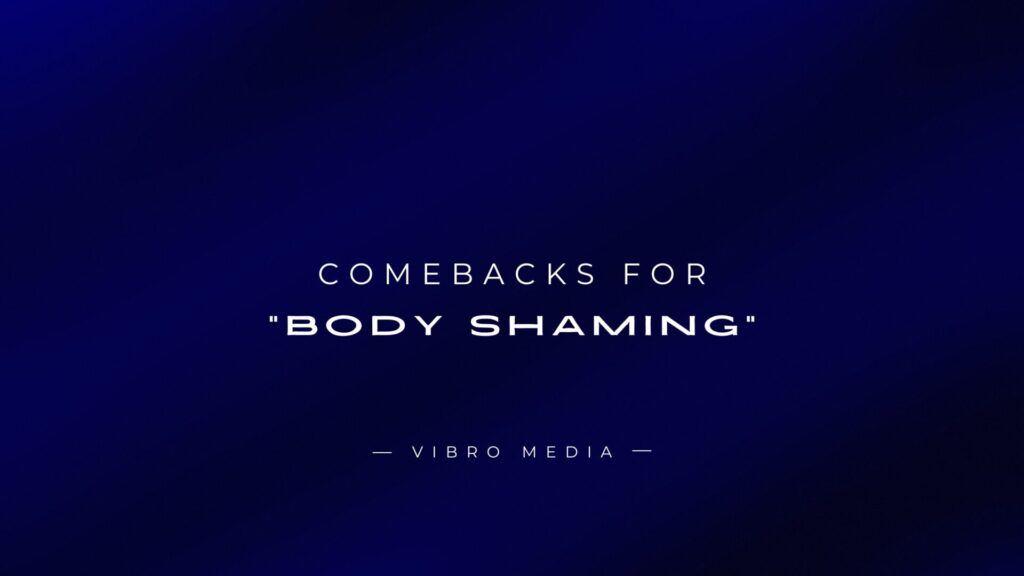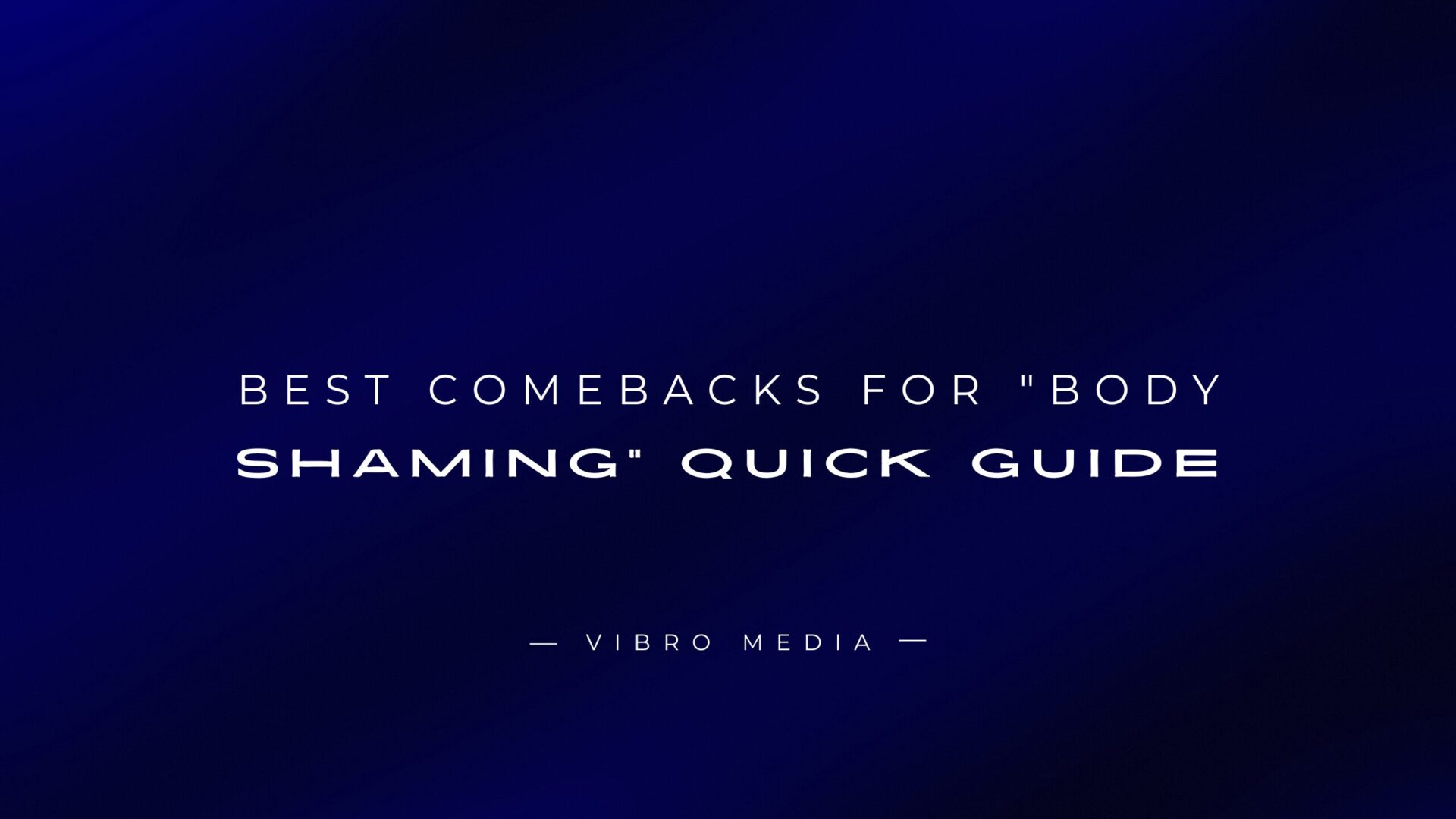Body shaming is, unfortunately, a widespread issue in today’s society. Whether it’s a snide comment about weight, height, or appearance, body shaming can take many forms, both subtle and overt. It leaves deep emotional scars that can affect self-esteem, mental health, and social interactions. But how do you respond to body shaming effectively without letting it hurt you or those around you? In this article, we’ll explore how to react to body shaming in a healthy and empowering way.
What Is Body Shaming?
Body shaming refers to the act of making critical or negative remarks about someone’s physical appearance. It can come in many forms, whether it’s making fun of someone for being too thin, too heavy, too tall, too short, or even for having certain facial features. Social media has become a central platform where body shaming thrives, with online trolls often hiding behind anonymous accounts to criticize others.
Body shaming isn’t just limited to weight; it can extend to any part of a person’s physical appearance, such as hair, skin tone, or clothing choices. It’s pervasive, and it’s toxic. Understanding what body shaming is helps us see the importance of standing up against it.

200+ Comebacks for “Body Shaming”
Empowering and Confident
- I love my body exactly how it is—thank you for noticing.
- I’m not here to meet anyone’s standards but my own.
- Confidence looks good on me, don’t you think?
- My body is mine, and I’m proud of it.
- I’m too busy being happy with myself to worry about others’ opinions.
- What’s important is how I feel about myself, not how you see me.
- My worth isn’t defined by my size—I’m perfect just as I am.
- I have more important things to focus on than my appearance.
- You’ll find me happier when I embrace my true self.
- If confidence were a crime, I’d be guilty as charged.
Humorous and Sarcastic
- Oh, I didn’t realize you were a body expert. Should I be taking notes?
- You should start charging for that kind of unsolicited advice.
- I’m trying a new look: ‘Who cares what you think?’
- Thanks. I want to know when my body will be up for public commentary.
- Do you give out unsolicited critiques for free, or is there a fee?
- I’m working on gaining more confidence. Do you care to help?
- I guess I need a PhD in body shaming to understand your point.
- I’d love to discuss my body with you, but I’m too busy living my life.
- I’ve heard of fitness goals but never body-shaming goals.
- Should I send you a thank-you card for your expert opinion?
Educating the Shamer
- Body shaming is harmful, and you might want to reconsider your words.
- Did you know that comments like that can damage someone’s self-esteem?
- There’s no one ‘right’ body type, and it’s time we embrace diversity.
- I’d love to see you focus on kindness and empathy instead of judgment.
- What if we spent more time building each other than tearing people down?
- You might not realize it, but your words can be much more harmful than you think.
- I’d encourage you to learn about body positivity—a healthier mindset.
- Everyone’s body is different, and that’s what makes us unique.
- It’s important to support each other, not judge based on appearances.
- The way we talk about bodies affects the way people feel about themselves.
Setting Boundaries
- That’s not something I’m willing to discuss.
- My body isn’t up for critique, thank you.
- Let’s keep the conversation respectful, please.
- I’m not comfortable with those comments; let’s change the subject.
- I don’t engage in discussions that disrespect me or my body.
- Please stop commenting on my appearance.
- I’d appreciate it if you kept those thoughts to yourself.
- I’m done with this conversation—let’s talk about something else.
- It’s not okay to make comments like that. Let’s respect each other.
- I don’t owe you an explanation for my body, and I’m not going to engage in this.
Self-Acceptance and Positivity
- I’m comfortable in my skin—thank you for your concern, but I’m fine.
- I embrace my body for what it is, and that’s enough for me.
- I focus on being healthy and happy, not what others think.
- I’m learning to love my body every day.
- No one’s opinion of me is as important as how I feel.
- I choose to see the beauty in myself and others.
- I am more than my appearance, and so is everyone else.
- I appreciate the journey to self-love and am proud of where I am.
- I believe in being kind to myself, and it’s been incredibly liberating.
- I’m not striving for perfection—just contentment and love.
Turning the Tables
- What makes you feel comfortable commenting on my body?
- Why is my appearance so important to you, anyway?
- It seems like you’re projecting your insecurities—let’s talk about that.
- Do you feel better about yourself when you put others down?
- If my body bothers you so much, maybe it’s time to look inward.
- What about my body makes you think you have the right to comment?
- How do you think your words impact others?
- Have you ever stopped to think that you might be hurting someone with those comments?
- You’d be happier if you spent as much energy loving yourself as you do criticizing others.
- Maybe it’s time we both stopped judging others for things that don’t matter.
Dismissive and Nonchalant
- I don’t care for your opinion, but thanks.
- Okay, and?
- That’s nice, but I’m still doing me.
- Noted, but I’m going to keep living my life.
- I’m not sure why you feel the need to comment on that.
- I don’t need validation from anyone, especially not from you.
- That’s an interesting perspective, but it’s not my problem.
- Your comment doesn’t bother me, so I’ll just move on.
- Thanks for the feedback, but I’ll pass on your judgment.
- That’s your opinion, and I’m going to keep doing it.
Emotional and Vulnerable
- That hurt my feelings. I don’t think you understand how much words can impact someone.
- I’ve struggled with my body image for a long time, and comments like that just make it worse.
- It’s hard enough to love myself sometimes without people pointing out things I can’t change.
- I’m trying my best to be okay with my body, but remarks like that set me back.
- I wish people would realize how damaging body shaming is. It makes me feel so small.
- That comment affected me more than you probably realize.
- I don’t think you understand how deep those words can cut. Please be more considerate.
- I’m doing my best to be comfortable in my skin, and things like that make it more complicated.
- Sometimes, the things people say stick with you longer than they think.
- I want to be accepted for who I am, but comments like that make me question everything.
Supportive and Reframing
- Instead of focusing on how I look, let’s appreciate what we’re capable of as people.
- We all have our insecurities, but let’s try to lift each other rather than tear each other down.
- I’d love to see us all embrace our unique bodies and stop measuring ourselves by others’ standards.
- How about we shift the focus to the amazing things our bodies can do, not just how they look?
- We’re all different, and that’s something we should celebrate, not criticize.
- Rather than judge bodies, let’s support each other and love them.
- Imagine how much better we’d all feel if we focused on kindness instead of criticism.
- Let’s be part of a movement that promotes body positivity, where everyone is accepted as they are.
- What if we encouraged each other to love our bodies no matter what?
- There’s so much more to me than what you see on the outside—let’s try focusing on that.
Sarcastic Compliments
- Wow, I didn’t know you were a professional body critic. Should I take notes?
- Oh, you must be the expert in body types—please tell me more.
- What a unique perspective! I’ve never heard that one before.
- Thanks for the feedback—I’m sure your opinion is the most important thing I need to hear.
- I’ll be sure to add your advice to my body-shaming handbook.
- I can always count on you to remind me how great I look.
- Oh, thank you for noticing! I’ve been working on my ‘don’t care’ attitude.
- Is that your new job? Body critique? You must be good at it.
- Oh, wow. I’m so glad you’re here to share your wisdom with me!
- Thank you for that unsolicited advice. I’ll be sure to file it under ‘not helpful.’
Redirecting to Personal Qualities
- I’d focus on what’s inside rather than how I look on the outside.
- My kindness and intelligence are what I’d like people to notice, not my appearance.
- I put energy into being a good person, and that’s way more important than my body.
- I’m proud of who I am and the kind of person I am becoming, not just how I look.
- How about we celebrate what makes me a good friend instead of how I look?
- I’d rather be known for my heart than my appearance.
- What matters to me is how I treat others, not how I look.
- I’m working on becoming a better version of myself, inside and out.
- If you’re going to judge me, at least judge me for the things that truly define who I am.
- I’m more than my body; I’m a hardworking, caring, and loving person.
No Response
- (Simply walk away with no comment.)
- (Silently shake your head and move on.)
- (Give a polite smile and change the subject.)
- (Look at the person briefly, then ignore them.)
- (Walk away without acknowledging the comment.)
- (Silently walk out of the room or situation.)
- (Maintain eye contact, then look away and keep walking.)
- (Nonchalantly ignore the comment and continue with your day.)
- (Give a calm, quiet nod and move on.)
- (Don’t engage; just look them in the eye and walk away.)
Shifting Focus to Health
- I’m more concerned with being healthy and feeling good than meeting anyone’s beauty standards.
- My focus is on being strong and feeling good in my body, not on its appearance.
- I work hard to stay healthy, which matters most to me.
- Health comes in all shapes and sizes—let’s focus on being our healthiest selves.
- I care for myself in the ways that matter most—through exercise, nutrition, and self-love.
- What’s more important than size is how I feel and feel great.
- I’m focusing on my overall health, and that’s my priority.
- Being healthy isn’t about fitting a mold—it’s about how you feel inside.
- I’m not striving for perfection; I’m striving for wellness and happiness.
- Health is more than looks—it’s about how your body functions and treats it.
Social Justice or Feminist Angle
- Body shaming is a reflection of society’s unrealistic beauty standards. Let’s fight that.
- We live in a world that constantly judges people by their bodies, but I believe it’s time for a change.
- Feminism teaches me that everybody is beautiful, no matter the size.
- Our worth isn’t defined by hourly appearances, which are about who we are.
- It’s time we stop judging people based on their appearance and start embracing diversity.
- Society has conditioned us to believe that only one body type is desirable, but that’s not true.
- Feminism isn’t just about equal rights—it’s about accepting and celebrating all bodies.
- The body positivity movement rejects societal standards and embraces everyone’s unique beauty.
- We should empower people, not tear them down based on their bodies.
- The fight for body acceptance is part of the more significant movement for equality—let’s lift each other.
Reverse Questioning
- Why does my body matter so much to you?
- What makes you think it’s okay to comment on someone’s appearance?
- Have you ever thought about how your words might affect someone?
- Why do you feel the need to judge me based on my looks?
- What does my body have to do with our conversation?
- Do you feel better about yourself by pointing out others’ flaws?
- Is there something you’re not happy about yourself that makes you feel the need to comment on others?
- Why do you think making someone feel bad about themselves is okay?
- How would you feel if I commented on your body like that?
- What if we spent less time judging and more time supporting each other?
Empathy and Understanding
- I understand that you might not realize how hurtful your words can be.
- Sometimes, people don’t mean to hurt others, but comments like that can be damaging.
- You didn’t intend to make me feel bad, but that comment stings.
- It seems like She is having issues, but I’d appreciate it if we didn’t project them onto others.
- I know that body shaming comes from insecurity, but it still affects me deeply.
- We all have our battles and have become kinder to each other.
- I understand that not everyone has learned to be sensitive to body issues, but I hope you can consider how it affects people.
- I can empathize with how tough it must be to feel the need to judge others. But we all deserve respect.
- Society pressures us to look a certain way, but focusing on being kind to ourselves and others is essential.
- I understand that you may have your insecurities, but putting others down doesn’t help anyone.
Challenging Society’s Beauty Standards
- Society’s idea of beauty is narrow—there’s more to us than our appearance.
- We should embrace all body types, not just the ones that fit society’s standards.
- Beauty standards are unrealistic, and I’m not here to conform to them.
- I believe in beauty beyond the surface, and so should everyone else.
- No one ‘right’ way to look exists, and we should stop forcing people into molds.
- I’m not interested in chasing someone else’s idea of beauty. I’ll define it for myself.
- Society tells us what’s ‘beautiful,’ but I love my body as it is.
- We’re so much more than how we look, and I’m tired of people defining me by my body.
- The world needs more body acceptance, not more body shaming.
- We should celebrate diversity, not fitting into a cookie-cutter mold of beauty.
Confidence Through Humor
- Thanks for the feedback, but I’m sure I’m still wearing this outfit anyway!
- I didn’t realize I had to meet your standards to leave the house today.
- I must’ve missed the memo saying we’re all supposed always to be; you’re right. I should start taking body-shaming advice more seriously.
- You’re right; I should be more concerned with your opinion of my body than how I feel about it!
- If only I had a dollar for every time someone tried to body-shame me. I’d be rich by now!
- I’ve got a great idea—let’s turn all this negativity into a stand-up comedy special!
- I’m not sure where you got your PhD in body shaming, but I’ll be sure to ignore it.
- I’ve got a body; it works just fine, and I love food. Who’s with me?
- Don’t worry; I’ll work on my ‘perfect’ body after living my life.
Reaffirming Personal Strength
- I’m strong enough to rise above comments like that.
- I’ve fought hard to love my body, and I’m not letting negativity change that.
- My strength comes from within, and that’s more powerful than any opinion.
- I might not fit your ideal, but I know my worth and strength.
- I’m proud of what my body can do, and no one’s words will make me doubt that.
- I’ve been through a lot, and I’m strong enough to handle any negativity that comes my way.
- You can try to put me down, but I know how resilient I am.
- I’ve learned to love myself, and that takes real strength.
- I’m confident in my abilities and body—your comment doesn’t change that.
- It takes real strength to be comfortable in your skin; I’ve seen that in spades.
Silencing with Kindness
- I’m unsure what motivates your comment, but I’ll ask you for some kindness instead.
- I understand you might have your struggles, and I hope you find peace with them.
- It’s not always easy to be kind, but I choose to be.
- I know sometimes we all say things we don’t mean. Let’s just be kind to each other.
- I’m sorry if my appearance bothered you, but I’m doing my best to be myself.
- I don’t hold grudges, so I’ll move forward with kindness.
- It’s hard to understand each other sometimes, but I will be kind regardless.
- Now read, Lizzie, how hurtful those words can be, but I’ll choose to be kind.
- It’s okay. You probably didn’t mean any harm, so I’ll let it go.
- I’m not here to argue, but I’ll respond kindly instead.
The Psychological Effects of Body Shaming
Body shaming can take a significant toll on mental health. It can erode self-esteem, making individuals feel insecure and less confident. Repeated exposure to body-shaming comments can lead to anxiety and depression. In some cases, it even triggers eating disorders like anorexia or bulimia, as people may turn to unhealthy coping mechanisms to try to conform to societal standards of beauty.
Long-term consequences of body shaming include chronic stress and self-esteem issues that might last well into adulthood. It’s not just a momentary embarrassment; body shaming leaves lasting psychological scars.
- The Social Impact of Body Shaming
The effects of body shaming ripple outward, impacting relationships and social interactions. Constantly body-shamed people may withdraw from social situations, avoid public places, or isolate themselves. This stigmatization can also lead to bullying in school, the workplace, or other environments.
Culturally, many societies put pressure on individuals to conform to an “ideal” body image, which creates an environment where body shaming is more acceptable. These unrealistic standards can alienate people from their communities, making it harder to feel accepted for who they are.
Why Do People Body Shame?
Why do people engage in body shaming? Often, it’s a reflection of their insecurities. People who are unhappy with themselves may project those feelings onto others. The media also plays a considerable role, constantly promoting the “ideal body” and perpetuating stereotypes of what beauty should look like.
Many people have body shame without even realizing it due to societal conditioning. They’ve absorbed years of unrealistic standards through advertising, TV shows, and magazines that glorify certain body types while demeaning others.
How to Respond to Body Shaming: A Step-by-Step Guide
- Step 1: Stay Calm and Collected
The first thing to remember when dealing with body shaming is to stay calm. Responding out of anger or hurt can be incredibly tempting, but reacting impulsively can often escalate the situation. Take a deep breath and remind yourself that the person’s comment reflects their issues, not yours.
- Step 2: Set Boundaries and Speak Up
Setting boundaries is crucial when responding to body shaming. Let the other person know that their comments are not acceptable. You can say, “I don’t appreciate those remarks about my appearance.” Assertiveness is vital—stand your ground, but avoid becoming confrontational. This will often make the person think twice about making similar remarks in the future.
- Step 3: Educate and Raise Awareness
Sometimes, people don’t realize how hurtful their words are. Use the moment as an opportunity to educate them. You could say, “Comments like that contribute to a negative body image, and it’s something we should all work to change.” Redirecting the conversation toward body positivity can help shift their mindset.
- Step 4: Lean on Support Systems
Dealing with body shaming can be emotionally draining, so it’s essential to have a support system in place. Whether it’s friends, family, or a counselor, talking to someone you trust can help you process the experience. If the body shaming is severe or persistent, don’t hesitate to seek professional help.
- Step 5: Practice Self-Love and Acceptance
The best response to body shaming is to love and accept yourself fully. Build your self-confidence by focusing on your strengths and surrounding yourself with positive influences. Affirmations, self-care, and avoiding harmful environments can help you maintain a healthy relationship with your body.
How to Support Someone Experiencing Body Shaming
If someone close to you is being body-shamed, offering them empathy is the best way to support them. Listen to their concerns without judgment, and remind them that their appearance does not define their worth. Encourage them to seek help and stand by them as they process the situation.
Social Media and Body Shaming
Social media is one of the most common places where body shaming occurs. From cruel comments on posts to entire threads dedicated to criticizing someone’s looks, it’s easy to feel overwhelmed. If you experience body shaming online, remember to use the tools available to you—block the offender, report the comment, and take a break from the platform if necessary to protect your mental health.
The Importance of Body Positivity and Inclusivity
The body positivity movement advocates for accepting all body types, challenging societal norms that promote a narrow view of beauty. It’s about embracing diversity, encouraging self-love, and creating an inclusive environment where everyone feels comfortable in their skin.
Body Shaming in Different Age Groups
Body shaming isn’t limited to a specific age group; it can affect children, teens, adults, and even older individuals. In younger generations, it can stem from bullying at school, while adults may experience body shaming in the workplace or social circles. Addressing these issues at every stage of life is crucial to fostering a more inclusive society.
The Role of Media and Pop Culture in Body Shaming
Celebrities and influencers often influence body image perceptions for better or worse. While some promote unhealthy standards, there has been a recent shift towards celebrating diversity and rejecting traditional beauty ideals. As media continues to evolve, so does its message about body image.
Legal and Ethical Considerations
Many workplaces now have policies in place to protect employees from body shaming. Additionally, cyberbullying laws address online harassment, including body shaming. It’s essential to be aware of your rights and to stand up against body shaming in any environment.
Why It’s Important to Speak Out Against Body Shaming
Speaking out against body shaming helps you take control of the situation and contributes to changing societal norms. By addressing body shaming head-on, you inspire others to do the same, fostering a culture of respect and acceptance.
Conclusion
In conclusion, dealing with body shaming can be challenging, but with the right mindset and a few empowering comebacks, you can confidently shut down negativity and promote self-love. Remember, someone else’s opinion doesn’t define your worth, and the best response shows strength and positivity. If you also deal with hurtful comments online, check out our guide on 200+ Brilliant Comebacks to Destroy “Online Trolls.” Here are more strategies to stand up against trolls and spread positivity. City
FAQs
Q. How can I stop body shaming myself?
Start by practicing self-compassion and focusing on your strengths. Surround yourself with positive influences and remind yourself that beauty comes in all shapes and sizes.
Q. Is body shaming illegal?
While body shaming itself may not be illegal, it can fall under harassment or bullying laws, particularly in the workplace or online.
Q. What should I do if I witness someone being body-shamed?
Offer support to the victim, stand up against the body shamer, and, if necessary, report the incident, mainly in a professional or public setting.
Q. How can parents protect their children from body shaming?
Encourage open communication, build their self-confidence, and educate them about the diversity of body types. Be a positive role model in promoting body positivity at home.
Q. Can body shaming lead to eating disorders?
Yes, body shaming can contribute to the development of eating disorders such as anorexia or bulimia, mainly if it negatively affects a person’s self-esteem and body image.










